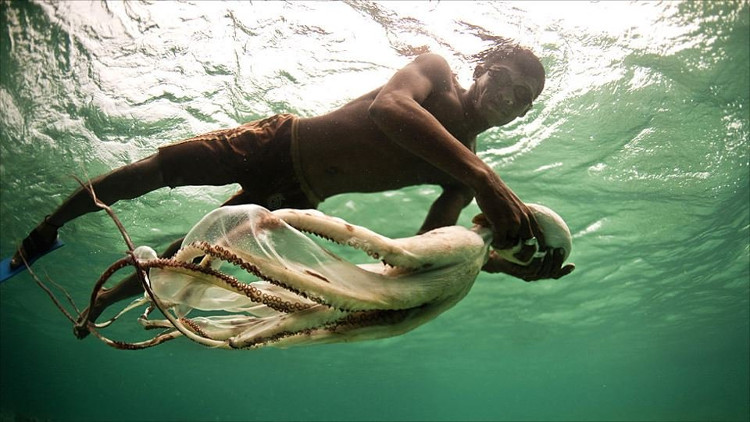The first human race evolved to dive 70 meters deep
The Bajau people currently living in Indonesia possess another large spleen that is often suitable for sea fishing.
The Bajau tribe living in Indonesia has another unusually large evolutionary spleen that helps to dive freely to a depth of up to 70m, the Mirror reported on April 19. This is the first time scientists have discovered genetic changes in humans to adapt to submerged diving.

The Bajau can dive very deeply.(Photo: James Morgan).
The Bajau tribe , or "Sea Man", lives on boats and catches fish by diving freely in the southern Asian waters for more than 1,000 years. They currently live in Indonesia and are famous for their ability to hold their breath. Tribal members can dive very deep without using any support equipment other than a set of weights and goggles.
The spleen plays an important role in helping the body react when diving. Heart rate will be reduced, blood is taken to essential organs, the spleen shrinks to push oxygen-rich red blood cells into blood circulation. Shrinking of the spleen can increase body oxygen to 9%. The large spleen contains more oxygen-rich red blood cells, thereby increasing the time to stop breathing.
The new study shows that the spleen of the Bajau is 50% larger than the Salanians who live mainly on land."There is not much information about the spleen who considers physiology and genetics, but Weddell's deep-sea diving seals possess a huge spleen. I think if natural selection makes seals carry a large spleen. so can humans, " said Melissa Ilardo, a scientist at Cambridge University.

A dive into the water to catch fish of the Bajau.(Photo: James Morgan).
Ilardo stayed in Jaya Bakti, Indonesia, for several months to sample the gene and ultrasound the Bajau and Saluan people. The results show that the spleen of the Bajau is permanent and not only temporarily.
DNA analysis shows that Bajau people carry the PDE10A gene that Saluan people do not have. This gene is thought to alter the size of the spleen by regulating the amount of thyroid hormone."In mice, thyroid hormones and spleen size are related to each other. If the gene is changed so that mice lack T4 thyroid hormone, the spleen size will be significantly reduced, while adding T4 is the opposite" , explains Ilardo. .
The team is not sure exactly how long the Bajau can stay in the country. One of the tribesmen told Ilardo he dived for 13 minutes. Scientists hope new research can help people better understand acute hypoxia.
- Why is there a deep diver without oxygen tanks?
- Super yacht can dive 240 meters for $ 2.3 billion
- Dive into the South Pole Sea 97m, the world record
- The loser, the winner in the race evolved
- Why do sea turtles dive underwater?
- This is a human face if evolved from other animals that are not apes!
- Antarctic Project-100: Russian divers reach the world record
- See 'human beauty' if evolved from pigs, cows and bears
- The robot dug deep under water
- Why did human ancestors win the evolution race?
- Vietnam successfully tested small-sized diving vessels
- The first race on the Moon may take place next year
 'Fine laughs' - Scary and painful torture in ancient times
'Fine laughs' - Scary and painful torture in ancient times The sequence of numbers 142857 of the Egyptian pyramids is known as the strangest number in the world - Why?
The sequence of numbers 142857 of the Egyptian pyramids is known as the strangest number in the world - Why? History of the iron
History of the iron What is alum?
What is alum?